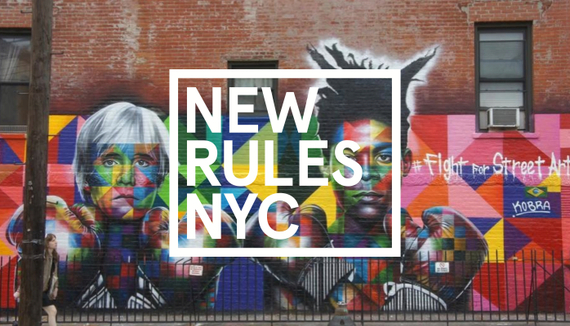Over the last 10 years there have been huge changes in the way people approach success within creative fields and unlocking avenues for fulfillment within their craft. Influenced by technology, evolving industries and new priorities -- the required skill sets have evolved and expectations have also shifted.
Over the course of this year I'm going to explore some of the above themes through a real-time novel project called NewRules.nyc, but I thought I'd pull some out here for a quick blog.
Hybrid Skills and Training
The hybrid skill set has been extremely successful over the last few years, whether that is someone in advertising that can draw insights from data and mock up a rough creative concept or a DJ that produce tracks and shoot high quality video. New platforms and tools are emerging all the time, take something like filmmaking, the essence of it hasn't changed but if a filmmaker doesn't take the time to test the capabilities of something like the Oculus rift, how can the expect to leverage its potential.
It has never been more important to keep learning, knowledge of new tools gives you an edge -- and it's also never been easier to learn thanks to platforms such as Skillshare or Codecademy.
Make Something Happen
The other reason these hybrid skill sets are so important is that they make it easier for you to make projects happen. The more you understand or can do yourself, the less you rely on others or funding. The top resumes or portfolios are full of side projects, interesting concepts that potential clients or employers will find interesting or something they will remember from one of their favorite blogs.
The more you understand or can do yourself, the less you rely on others or funding.
The ability to get out there and create something is essential. Don't wait for permission. Create something and don't be shy to send it to someone at the company you would love to work for. It'll be far more successful than any resume.
Create Leverage
Creating something and building momentum is essential, it creates leverage to climb that next wall. No one can argue with it. It's rare for record labels to invest in an unknown artist, they want someone with a following already established. What can you do to show you already have what it takes? What leverage can you build to open the next door, and be paid what you are worth in the process?
Lena Dunham's parents told her after undergrad that they would either fund grad school or a feature film. She used the $25k to shoot Tiny Furniture, editing it herself. The film was shown at SXSW and the attention gave her the leverage she needed to get the HBO deal.
Amplify Your Work - Find An Audience
Not every idea is going to blow up instantly, leaving you with offers from HBO to create your own show. If you want to show some traction to land a new role, keep a client happy or simply get feedback from those other than your friends you need to understand how ideas spread and what you can do to help them.
You need to understand how ideas spread and what you can do to help them.
Organic Social Reach: Connect with like minds, build a relevant following. Don't be afraid to reach out to people and share something they might be interested in. Pick a couple of channels and focus on using a clear voice.
Blog & Press Coverage: The content cycle is insane. Everyone is looking for content to post everyday. Keep a list of blogs or contacts in the media that might be into your project, package it up in a way that makes it easy for them to share, creating a short video or packaging up relevant images with an overview.
Distribution & Paid Amplification: This is the one to learn. Once you know who your audience is, use FB and Twitter ads to get your content to them - then experiment with paid seeding platforms such as Outbrain. There are hundreds of options for even the smallest budgets. For distribution, check out platforms like VHX to sell your movie straight to fans, there countless other options that exist for bands. Don't rely on a publisher, label or gallery to market your work. You are the one who knows your audience the best.
Maintain Your Sanity
Some industries and roles are moving faster than others, but in creative pursuits it's important to be mindful of what works for you. 2014 saw a huge rise in the focus of mindfulness. Amongst the ever increasing noise, create space for your craft. If you need to disconnect in order to get something done, don't be afraid to get off the grid.
The most successful creators spend their life in endless pursuit of the situation and environment where they can do their best work.
In a world that's increasingly moving to a freelance model you can't expect opportunities to be handed out. The traditional career progression model is fading. There will always be someone younger than you, without a family, that will work all night for half the price to get your job. The creative space is competitive. The most successful creators spend their life in endless pursuit of the situation and environment where they can do their best work. Da Vinci slept for 20 minutes every four hours. Jobs wore the same thing almost every day; Christopher Nolan does the same, also opting to go without email or a mobile phone.
Creative careers are built on your ability to find your flow -- then master the most effective way to amplify the output.
If you're interested in more content based around these themes, subscribe to New Rules NYC, or start reading here.

